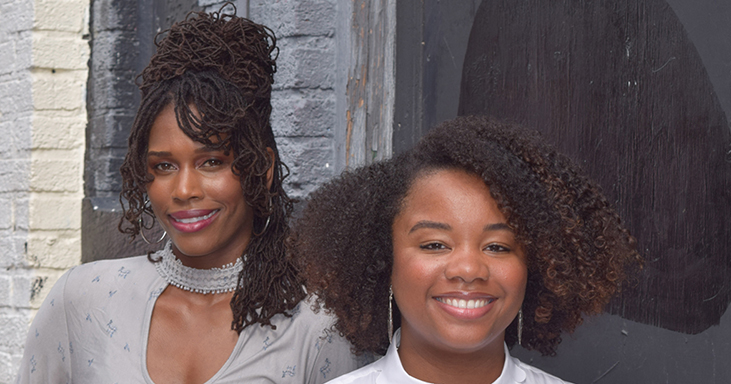
Lift Every Voice
iCubed postdocs elevate the historically marginalized in community-engaged research
By Jena K. Gray
“Community capacity building is important to research,” says Morgan Maxwell, Ph.D., of VCU’s Institute for Inclusion, Inquiry and Innovation (iCubed), “because if you can increase the capacity of the community to address its own needs, that’s where you’re really creating change.”
Maxwell is part of iCubed’s Culture, Race and Health Transdisciplinary Core (CRH Core) as a postdoctoral fellow. Her experiences in addressing health disparities through community-based research and pedagogy alongside communities of African ancestry world-wide will combine with nine other CRH Core members’ expertise to develop community-led, culturally-informed health interventions for the Crater Health District in Petersburg, Virginia.
Maxwell believes, alongside CRH Core member and postdoctoral fellow, Khalilah Johnson, Ph.D., OTR/L, that if researchers can assist in increasing a community’s understanding of their own needs and their ability to accrue the key resources to address those needs, researchers can successfully catalyze positive, sustainable community change.
Johnson contributes an additional perspective to the CRH Core by utilizing her training in occupational therapy and her experiences working with people of minority backgrounds who have significant intellectual disabilities, some of whom are non-verbal. Both qualitative researchers in their respective fields, Johnson and Maxwell express the importance of incorporating community members’ insights and needs within the design of the study, the focus of the study, and the logistics of the study.
“When you don’t have the ability to express, we impose a lot of things on you. We limit what you’re able to choose, we limit how you’re able to experience life,” expresses Johnson, as she shares of her efforts to bring to the table voices of people who are rarely heard, if ever.
She emphasizes the need to pay attention to the institutional structures which keep this group from building community and from participating in society as the able-bodied do. When working with members of the disability community, the largest socio-politically disadvantaged group in the world, Johnson expresses the need for practitioners and researchers to bring participants’ voices to the forefront authentically.
“We have to remember that we are not the experts in their experiences – they are,” Johnson says.
Johnson and Maxwell, now both as postdoctoral fellows at VCU, understand the university’s unique position in identifying key stakeholders on a particular issue and bringing them together within one room. Once around the table, community leaders, researchers, and other stakeholders can share expertise, contacts, and resources in order to more effectively reach a collaborative solution to the identified problem.
Johnson and Maxwell remark that they see VCU’s commitment to diversifying its faculty as one step toward changing the narrative for these communities. Diversely talented iCubed faculty members, postdoctoral fellows, and visiting scholars’ work aligns with VCU’s strategic plan, Quest for Distinction, as they foster mutually beneficial partnerships between the university and the community, facilitate community-engaged and culturally informed research, and form collaborative solutions to some of Richmond’s issues.
Both Johnson and Maxwell work closely with historically disenfranchised communities, Johnson with the intellectually disabled and Maxwell with people of African ancestry, particularly women of color. Each cites the sharp need for researchers, practitioners, and community workers who more closely resemble the people within these communities.
iCubed’s approach is non-traditional in scope and both Maxwell and Johnson believe that in order to address the increasingly complicated and global challenges, we must heed to a different approach. Maxwell holds that in order to raise up and prepare the next generation of scholars, problem-solvers, and members of our communities, the educational system must warrant critical thinking and experiential-learning wherein students apply the knowledge taught to them beyond the classroom.
With applied learning in collaborative environments where critical thinking is encouraged from a young age, the next generation will be more adequately prepared to meet the needs of a changing global climate.
However, Maxwell heralds the message of patience when she says,“We want immediate effects. We want to solve problems that took hundreds of years to accrue. But we must allow patience to take root and to understand that it is a process. You may not save the world, but the small victories still matter.”
Johnson describes iCubed as the model for training the next generation of scholars. She deconstructs the three “I’s”: “Inclusion – an interdisciplinary, team science approach to assessing and developing interventions to address challenges communities face; Inquiry – fostering a spirit of exploration and analyses; and Innovation – doing collaborative research on the front lines with members of the community.”
Maxwell adds, “When you include a diverse range of people at the ‘research table’, you can better inquire about perceived challenges and culturally specific barriers. With more folks at the table, you can better achieve new solutions and fresh perspectives. And that’s why iCubed is a transdisciplinary research model that people are going to pick up for years to come.”
* The contents of this document may not be reproduced in any form.
About iCubed
iCubed at Virginia Commonwealth University (VCU) is a cutting edge institute focused on catalyzing collaborative connections between the university and the community at large through innovative academic and research programs. Our transdisciplinary core teams collaborate with key community members in order to develop holistic solutions to 21st century urban challenges within the Commonwealth. For more information about iCubed or to apply to one of the transdisciplinary core teams, please visit: icubed.vcu.edu.

